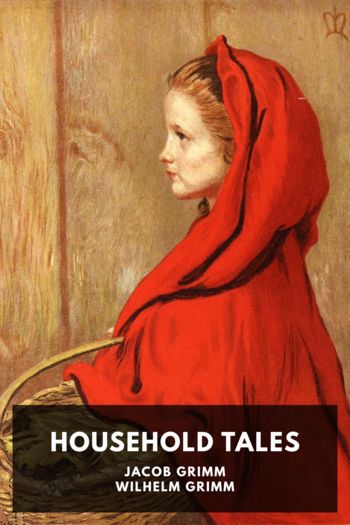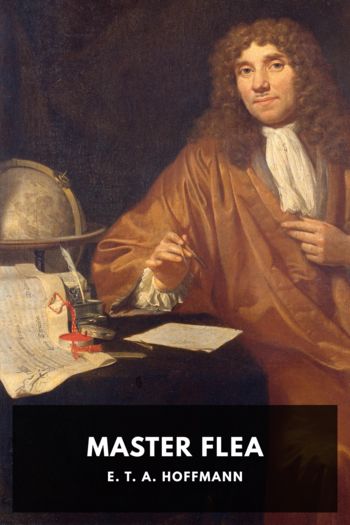Household Tales - Jacob Grimm (read me a book .txt) 📗

- Author: Jacob Grimm
Book online «Household Tales - Jacob Grimm (read me a book .txt) 📗». Author Jacob Grimm
“What!” said the tailor, “drag bread for seven days on one’s back like a beast of burden, and not be able to look about. I shall trust in God, and not trouble myself about anything! The money I have in my pocket is as good in summer as in winter, but in hot weather bread gets dry, and mouldy into the bargain; even my coat does not go as far as it might. Besides, why should we not find the right way? Bread for two days, and that’s enough.” Each, therefore, bought his own bread, and then they tried their luck in the forest.
It was as quiet there as in a church. No wind stirred, no brook murmured, no bird sang, and through the thickly-leaved branches no sunbeam forced its way. The shoemaker spoke never a word, the heavy bread weighed down his back until the perspiration streamed down his cross and gloomy face. The tailor, however, was quite merry, he jumped about, whistled on a leaf, or sang a song, and thought to himself, “God in heaven must be pleased to see me so happy.”
This lasted two days, but on the third the forest would not come to an end, and the tailor had eaten up all his bread, so after all his heart sank down a yard deeper. In the meantime he did not lose courage, but relied on God and on his luck. On the third day he lay down in the evening hungry under a tree, and rose again next morning hungry still; so also passed the fourth day, and when the shoemaker seated himself on a fallen tree and devoured his dinner, the tailor was only a looker-on. If he begged for a little piece of bread the other laughed mockingly, and said, “Thou hast always been so merry, now thou canst try for once what it is to be sad: the birds which sing too early in the morning are struck by the hawk in the evening,” In short he was pitiless. But on the fifth morning the poor tailor could no longer stand up, and was hardly able to utter one word for weakness; his cheeks were white, and his eyes red. Then the shoemaker said to him, “I will give thee a bit of bread today, but in return for it, I will put out thy right eye.” The unhappy tailor who still wished to save his life, could not do it in any other way; he wept once more with both eyes, and then held them out, and the shoemaker, who had a heart of stone, put out his right eye with a sharp knife.
The tailor called to remembrance what his mother had formerly said to him when he had been eating secretly in the pantry. “Eat what one can, and suffer what one must.” When he had consumed his dearly-bought bread, he got on his legs again, forgot his misery and comforted himself with the thought that he could always see enough with one eye. But on the sixth day, hunger made itself felt again, and gnawed him almost to the heart. In the evening he fell down by a tree, and on the seventh morning he could not raise himself up for faintness, and death was close at hand.
Then said the shoemaker, “I will show mercy and give thee bread once more, but thou shalt not have it for nothing, I shall put out thy other eye for it.”
And now the tailor felt how thoughtless his life had been, prayed to God for forgiveness, and said, “Do what thou wilt, I will bear what I must, but remember that our Lord God does not always look on passively, and that an hour will come when the evil deed which thou hast done to me, and which I have not deserved of thee, will be requited. When times were good with me, I shared what I had with thee. My trade is of that kind that each stitch must always be exactly like the other. If I no longer have my eyes and can sew no more I must go a-begging. At any rate do not leave me here alone when I am blind, or I shall die of hunger.” The shoemaker, however, who had driven God out of his heart, took the knife and put out his left eye. Then he gave him a bit of bread to eat, held out a stick to him, and drew him on behind him.
When the sun went down, they got out of the forest, and before them in the open country stood the gallows. Thither the shoemaker guided the blind tailor, and then left him alone and went his way. Weariness, pain, and hunger made the wretched man fall asleep, and he slept the whole night. When day dawned he awoke, but knew not where he lay. Two poor sinners were hanging on the gallows, and a crow sat on the head of each of them. Then one of the men who had been hanged began to speak, and said, “Brother, art thou awake?”
“Yes, I am awake,” answered the second.
“Then I will tell thee something,” said the first; “the dew which this night has fallen down over us from the gallows, gives everyone who washes himself with it his eyes again. If blind people did but know this, how many would regain their sight who do not believe that to be possible.”
When the tailor heard that, he took his pocket-handkerchief, pressed it on the grass, and when it was moist with dew, washed the sockets of his eyes with it. Immediately was fulfilled what the man on the gallows had said, and a couple of healthy new eyes filled the





Comments (0)